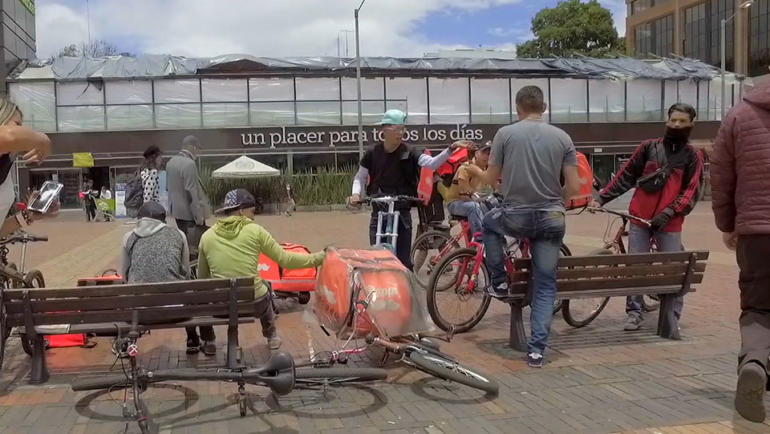About 1.3 million Venezuelans fled political and economic crisis at home for work in neighboring Colombia.
In a country with its own unemployment troubles, digital platforms offering freelance work are quickly becoming the best option for migrants.
CGTN’s Michelle Begue reports.
Every day 29-year-old Sofia Guerrero gets on her bike and pedals through all kinds of obstacles to make a living.
“We battle thirst, rain, heat, hunger, all types of difficulties, even going to the bathroom. But we continue,” Guerrero said.
Guerrero is a sort of freelance personal shopper. She works for the Colombian mobile app called Rappi, which promises a fast and prompt delivery of anything and everything for its users.
Guerrero is accompanied by her husband Andrei Garcia. As Venezuelan migrants living in Bogotá, finding work was difficult. Digital platforms that offer freelance work, like Rappi, Doordash and Uber, became their best option for making money.
“It is an independent job. you don’t have to answer to a boss, you are your own employer. And it is a company with a presence in many countries of Latin America,” Garcia said.
The job isn’t at all easy. Guerrero works from 8:00 am to 10:30 pm Monday through Monday. The company pays her according to the distance traveled. She says can earn anything from 4 to up to 12 U.S. dollars a day, depending on the demand. Competition has become fierce. “There are many Venezuelans. There are so many Rappi working. There just isn’t enough work anymore. There can be 100 requests for delivery, but there are thousands of Rappi.” added Guerrero.
Rappi has come under criticism most recently because of the shortcomings of working in the so-called gig economy. Entertainers sometimes refer to their performances as ‘gigs.’ The word has become a slang term referring to almost any short-term, freelance work. In the gig economy, freelancers get fast cash. Employers save cash, because they don’t have to pay employee health benefits.
And for Sofia, this jobs means less harassment. When she first arrived three years ago, she began working as a manager at a bar where men made assumptions about female refugees.
“I came here to work, never to sell myself. I won’t do it, no matter how difficult things get. Everyone has the right to do with their body as they please, but let’s not judge everyone the same. Because not all of us [prostitute] ourselves,” she added.
Her strength to keep going is her 12-year-old daughter, who is still back at home.
Sofia hasn’t seen her in almost two years, “She recently graduated and I would have liked to be there but couldn’t. She asks me to bring her, but I am not yet stable here for her to come live with me.”
Colombian lawmakers continue to look for ways to regulate the tech industry to protect workers and customers. But time means money and these migrant workers don’t have the time, or the money, to wait they just have to keep pedaling.
 CGTN America
CGTN America

